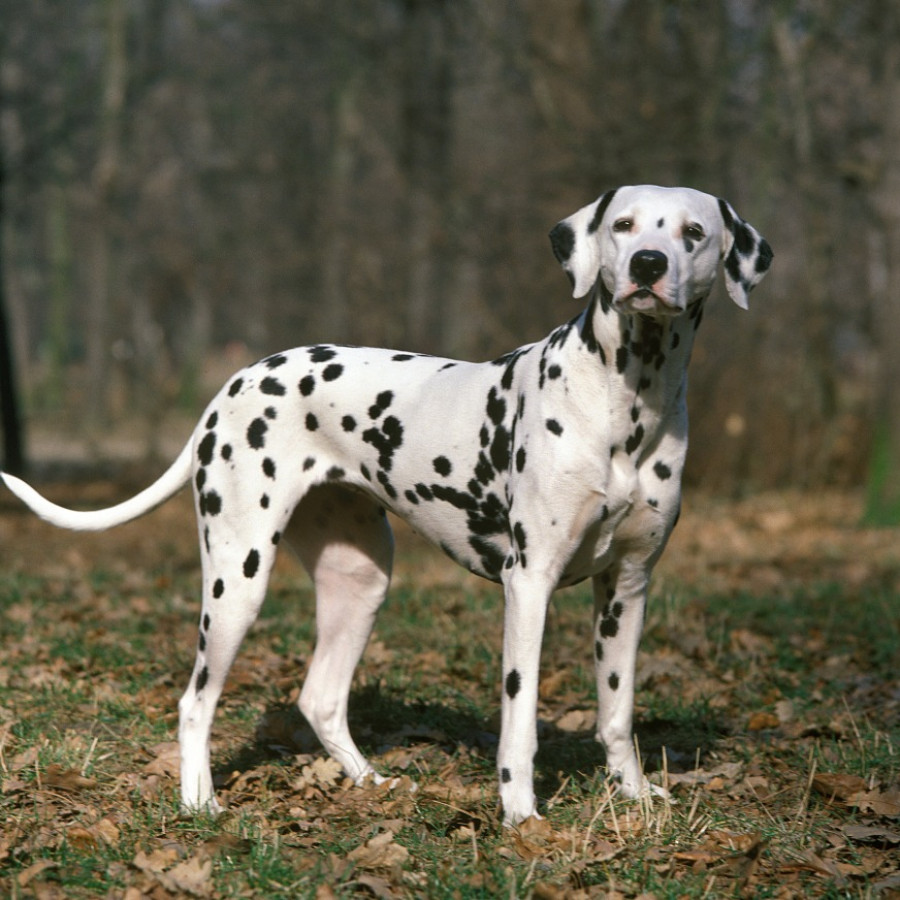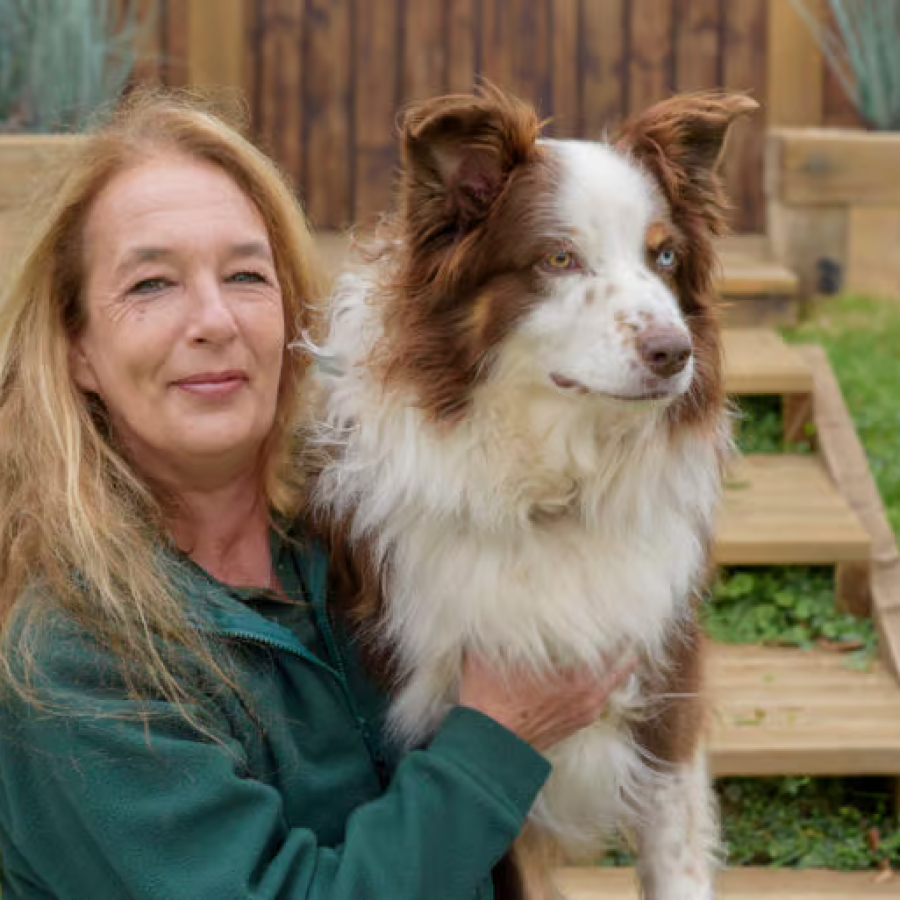
Dalmatian Dog Breed
Spotty, sporty and smart! Dalmatians love goofy playtime and would make a delightful addition to an active household.

Spotty, sporty and smart! Dalmatians love goofy playtime and would make a delightful addition to an active household.
The Dalmatian dog breed is famous for their white coat with black or brown spots. They’re a medium sized dog, historically used for hunting, tracking, even guarding (moving!) horse-drawn carriages.
They have boundless energy so if you are an active person who loves the outdoors a Dalmatian with its energetic Dalmatian temperament could be right for you!
Dalmatians, known for their energetic temperament and friendly personality, form strong bonds with their immediate family but can be reserved or aloof with strangers. Dalmatians are full of energy and have immense stamina. If their exercise needs are met, they’ll be calm and affectionate at home. They’re naturally protective so make excellent watchdogs too.
This bright breed responds well to reward based training, but they can also be strong-willed and so sometimes are a challenge to teach.
Distinctive Dalmatian characteristics include their playful nature and need for plenty of attention. If you want to share your life with one you must have plenty of time to meet their exercise and mental stimulation needs. Be dedicated to your Dalmatian and they’ll reward you with their wonderful companionship.
Disclaimer
While these breed traits give a general idea of what to expect from a specific type of dog, it's important to remember that every dog is unique. Just like people, each dog comes with their own distinct personality, quirks, and characteristics!

The Dalmatian can make a great family dog providing everyone in the household can cope with their lively personality, need for long and frequent walks, and adoration of energetic playtimes.
They may be too much for young children who can get knocked over when a Dalmation is gambolling about with excitement. Dalmatians have sensitive ears and won’t tolerate them being pulled or pinched, so it’s important they’re around children who can respect their space.
For a family with older children who love being outdoors and going on long hikes, a Dalmatian could be a great addition to the household.
If their exercise and emotional needs are met Dalmatians certainly can be affectionate.
They’re incredibly loyal dogs and want to be with their family or main caregiver. They will happily snuggle up next to you on the sofa in the evening after a day of play and exercise.
They need affection and will solicit your attention by following you around, nudging you with their nose or gently woofing at you.
Whilst this might seem adorable it also shows that this breed thrives on companionship and doesn’t cope well when left alone. It’s important that you have a lifestyle where your Dalmatian won’t be left home alone for extended periods.
Yes! Dalmatians are incredibly playful and have an almost clownlike persona when it comes to having fun.
They love to play games of fetch and can go for as long as your arm muscles can stand!
They also love to use their nose, hide and seek and scent games are something the whole family can get involved in. Hiding treats around the house and garden is a great way to keep them entertained. They also enjoy a good game of tuggy.
Whilst they can be a rambunctious breed, they can also be quite sensitive, therefore games of rough and tumble are not advised.
Dalmatians are a vocal breed but that doesn’t mean they bark excessively. They give low woofs, communicative grumbles and of course they bark.
They are excellent watchdogs and will definitely let you know when someone knocks on your door, or if they sense a potential intruder.
This busy, energetic breed craves companionship so will also bark to let you know their needs are not being met and they’d like some love and attention.
If you can cater to a Dalmatians physical and emotional needs they’re unlikely to become nuisance barkers.
Like all breeds, Dalmatians can develop behavioural issues if their physical and mental needs are not met. These can include disruptive behaviours, including; nuisance barking, jumping up, food guarding, and running off on walks.
Socialisation is essential for all breeds and the Dalmatian is no exception. As puppies they must be exposed to sights and sounds that they’re likely to encounter in their day-to-day life. Failure to do so can result in fear-based aggression.
Dalmatians are known for being strong-willed, independent thinkers. Some people can find this challenging, but you just need to think outside the box to keep them motivated.
If you keep your Dalmatian well exercised, mentally stimulated and well trained you will prevent or reduce the likelihood of any problems occurring.
If you are thinking of taking on a Dalmatian puppy, be prepared for the first two years... it could be a bit of a bumpy ride! They are full of energy, have lots of stamina, an independent streak and require a lot of your time.
They need an enclosed garden that is escape-proof as their high prey drive makes them prone to running off. So, it’s also important they have access to green spaces and/or enclosed fields for daily exercise.
Well socialised Dali’s can live with other dogs, and even with cats if they are introduced as young pups. Because of their high prey drive, they should not be trusted with small pets such as rabbits or guinea pigs.
So, if you’re an active person/family that loves being outdoors, enjoys dog training, and won’t leave this loyal breed home alone for extended periods, the Dalmatian could be a great choice.
The Dalmatian needs a lot of exercise. Ideally, two one-hour walks a day. They have lots of stamina and love to run around. Their strong prey drive means that their recall can be unreliable in rural areas, so consider hiring an enclosed field for free running exercise.
Dali’s make great running partners, but you will run out of steam before they do. They also love to swim so finding a safe body of water for them to wade through or swim in is a great way to get in their exercise.
Dalmatians also thrive on mental stimulation; their intelligent minds need a workout too! This can be achieved through playing scent games with them, trick training, using puzzle feeders, and interactive play.
If you don’t give your Dali the right amount of physical and mental exercise, behavioural issues are likely to occur.
Dalmatians are moderately easy to train. As an intelligent, strong-willed breed they require patience and perseverance when learning.
They are a working breed at heart, so try to channel their natural enthusiasm to be useful with kind, fair, and effective training.
Concentrate on teaching a reliable recall. Dali’s need to be able to enjoy off lead exercise but they also have a strong prey drive. Use a harness and longline to ensure they can’t run off chasing wildlife. Use toys and high value treats such as hot dog sausages to reward them coming to you when called.
Like all breeds, it’s best to start training from eight weeks of age. Puppies' brains are like little sponges, and they’re open and willing to learn new things.
Adolescence is a challenging time where they will test their boundaries, hang in there, you will be rewarded once they reach maturity!
They may be a short-coated breed, but the Dalmatian is classed as a heavy shedder and their very short hairs stick to everything!
A daily once-over with a rubber grooming mitt is helpful to minimise hair on your carpet, furniture and clothes.
Regular grooming sessions also give you the opportunity to check for lumps, cuts or unwanted parasites.
Like all breeds, Dalmatians can be prone to some specific health conditions. There’s two that are particularly relevant.
The first one is deafness. It’s essential you choose a breeder that carries out hearing tests on their breeding stock AND on their puppies before they go to new homes. The second one is urinary stones/kidney disease.
Dalmatians can also suffer from hip dysplasia (malformed hip joints) and epilepsy.
Owing to their deep chests, Dalmatians are also at risk of bloat. This is when the stomach fills with air and twists within the abdomen. It’s life-threatening and must be treated by a vet immediately. To significantly reduce the risk of bloat, never walk your Dalmatian (at minimum) an hour before or after they have eaten.
If your Dalmatian lives a healthy lifestyle, receives a good diet, and has regular veterinary check-ups you can expect them to live to 13 years of age.
I am a Dalmatian and I require lots of exercise – at least two hours of vigorous movement every day. I’ve got lots of stamina, so it’s vital to exercise my brain too.
I’m an intelligent breed so I need to use my brain to stay happy. I love using puzzle feeders and playing scent games.
I love anything that involves running and using my nose. I enjoy agility and retrieving games too. Please help me learn a strong recall so I can enjoy off-lead exercise.
You should expect to pay up to £1,800 for a Dalmatian breed puppy.
The set-up costs for any puppy can run to several hundred pounds. This includes bowls, food, bed, toys, collar, lead, harness, puppy pen, stairgate, vaccinations etc.
The ongoing costs include food, insurance premiums, vaccinations, parasite control and any additional expenses for meeting your Dalmatian’s exercise needs and general care.
Take our quiz to discover which breed is right for you
Take our quizPlease call our pet support line on 0300 303 9333 (7 days a week – 8.30am - 4pm)